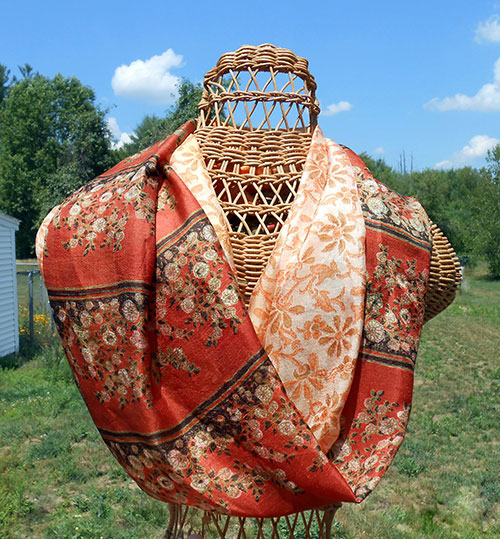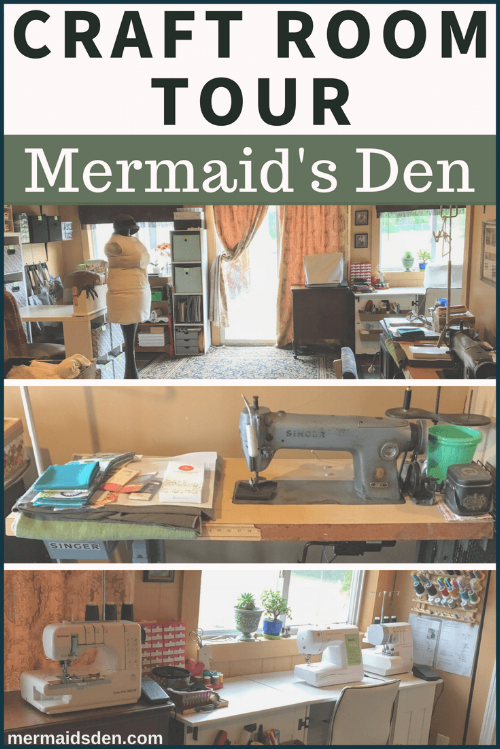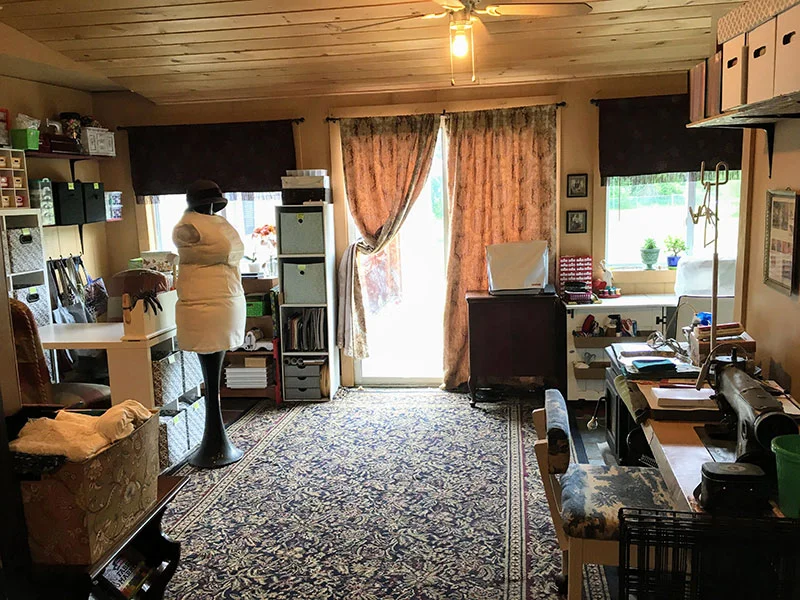Mermaid's Den Craft Room Tour and Organizational Tips
In this post, I'll show you the current state of my craft and sewing room, plus I'll offer some tips for organization and storage. Just so you know, my craft room doesn't always look this nice. Recently, it got so bad that it was basically nonfunctional. It looked like an episode of Hoarders was hit by a tornado. Projects and ideas were piled on top of each other, and I couldn't find anything. It took the better part of week, working every day, to get everything organized, but I think I've got it set up in such a way that I'll be able to keep it (mostly) clean from now on!
Disclosure: This post contains affiliate links, which means I may receive a percentage if you make a purchase using these links. This won’t cost anything extra to you. See my privacy policy for more details.
Mermaid's Den Craft Room Tour
Let's start with the best part: the craft room tour! I love seeing other people's creative spaces, and I hope mine gives you some ideas for your own.
The Main Craft Room
Here's a shot of the full craft room (or as much of it as I can get into one picture):
Here's the side of the room with my Singer 281-1 industrial sewing machine. Don't worry--that pellet stove is nonfunctional. It's just heavy, so it lives in my craft room as an ironing station for now.
Here's where the non-industrial sewing machines live, including the Singer Profinish serger, Singer Fashion Mate sewing machine, and Janome Coverpro coverstitch machine.
This section is mostly storage for paper goods, paint, and smaller craft supplies.
This section has storage for some display items, fabric, polymer clay, markers, and the many bags I've made!
I used to do a lot of beadwork, so this table has all of my jewelry and beading supplies. I thought about storing this stuff away, but I have made some jewelry projects lately, so I decided to keep it all out.
This section of shelving has most of my fabric and sewing supplies. I sorted my fabric into bins to make it easier to find.
This Hoosier cabinet has some fabric and all of the various sewing machine attachments and parts I've accumulated from my vintage sewing machines. The White sewing machine is on display up there until I find a table or case that will fit it.
This bin is where I keep current projects and things I want to work on soon.
Craft Room Spillover Area 1
It turns out that I have a lot of fabric and sewing machines. So this is where the auxiliary fabric and sewing machines live. I have posts planned for all of these sewing machines--I just haven't gotten to them yet!
I also have my collection of toy sewing machines on display in here.
Craft Room Spillover Area 2
I recently got a Leclerc Artisat floor loom, so that kind of needed its own space. You can see its predecessor, the Schacht Flip rigid heddle loom, in the foreground.
The floor loom is in front of a functional pellet stove, but luckily it can fold up and be moved pretty easily once the weather turns colder. I might rearrange the main craft room to find space for it.
Organization Tips: Craft Room Tables, Sewing Tables, and Chairs
I'm always looking for good craft tables and chairs. Overall, I really like this sewing table and this rolling, padded white chair. The table has some good storage space, and fits my sewing machine and serger, along with space for whatever project I'm working on.
I leave it open most of the time, but the table can also fold up to create more space, and it has wheels, so you can move it around if you need to.
This table with cubbies is great for storage purposes. I bought these banker's boxes, which fit well in the cubbies. They overhang a little bit in the front, but not enough to become unbalanced.
I bought these chairs at a thrift shop, intending to reupholster them after my first successful reupholstering project. They're comfortable and well-made, but the fabric is stained and faded. However, these proved to be more complicated than I thought, and after pulling out approximately 50,000 staples, I took a break from them. They're still on my to-do list, though.
I also found this chair at a thrift shop, and it looks like someone else already reupholstered it for me!
I believe this chair is even meant to be a sewing chair, since they often have storage built into them. Next time you see a chair like this, check to see if it flips up!
Organization Tips: Fabric Storage
I decided to sort all of my fabric and put it in bins. I sorted it into knit, apparel, home decor, quilting cotton, fleece/flannel, and lining fabric. I also have bins for vintage linens and clothing that I want to refashion.
I found that it was easiest to have each bin on its side while sorting the fabric. That way, fabric didn't just collapse in on itself while I was filling up the bin.
When I clean, I often have trouble finding things, so I added clip-on labels to all of my bins, so I'd be able to quickly and easily identify where everything is.
I recently bought a large lot of vintage hankies. I've seen a lot of cool handkerchief crafts on Pinterest, so I'm excited to see what I can do with them. I put them in a plastic bin that I got from the dollar store.
I've stacked some fabric in this cabinet. It's kind of nice to be able to see it through the class door. The only downside is that some fabric is hidden behind the wood panels, so I try to keep less exciting fabric in those sections.
I put my leather in the drawer of this cabinet. Most pieces are rolled up, and they fit well in here.
I use this tall laundry bin for storing rolls and bolts of fabric.
Organization Tips: Pattern Storage
I use comic book boxes for storing patterns. I use comic book boards and bags to help safeguard my patterns, since I have some crumbly vintage patterns.
The multi-pocket file folders are for magazines, thin books, small patterns I've made, and pdf patterns that I've printed.
Organization Tips: Bead and Button Storage
I have a lot of buttons, stones, and cabochons, which I decided to store in these containers. See my post on a brief history of buttons for more on my collection.
I also have a lot of vintage and antique seed beads, so I decided to store them in this container, which helps to protect them, but also showcase them. I like this better than the divided, molded plastic containers I was using, because you can take one or two little containers out, and put the rest back, instead of needing to keep all the beads out. This applies to the containers above, too.
Organization Tips: Thread Storage
This thread rack fits pretty much all of my thread, even some of the larger spools, where I used straws to extend the size of the wooden pegs.
This plastic bin with thread tray insert is great for holding serger thread cones. They're a little too tall to fit on the wooden spool rack. I doubled the storage space in this bin by turning extra cones upside down.
Organization and Decoration Tips: Other
I use a coat rack to store my ironing board and a few other things. There's another one on the other side of the craft room where I hang my handmade bags.
Along the entryway to the craft room, there's a long tension rod. This is great for hanging works in progress or hanging up fabric after I've ironed it, so it doesn't get wrinkled again.
Organization Tips: Getting Rid of Stuff You Don't Need
I mentioned how my craft room became so messy it was nonfunctional. Part of the problem was that I simply had too much stuff, so I decided to get rid of anything that I didn't see myself using in the near future. The question then becomes: what do you do with the stuff you don't want?
You can donate to a local thrift store, but I tend to shop at local thrift stores, and I don't like going through my own stuff. Either I get excited because it looks like there's a big craft supply haul or it tempts me to buy things back
So I donated two trash bags full of fabric to Planet Aid instead. If you've ever seen those big yellow bins that say "Clothes and Shoes," that's Planet Aid. According to their FAQ:
"Planet Aid accepts clothing, shoes, and other textiles (for example, bedding, towels, and curtains). This means that there is no need to separate items based on their condition. Even items that are stained, torn, or frayed can be recycled, so drop off your worn-out items, too! The only articles of clothing we cannot accept are those that are dirty, wet, or moldy."
So you can give them pretty much anything that you might need to get rid of. Now you might be thinking, wait, are you sure they take fabric or do they just take clothes and linens?
This section explicitly says that:
"Planet Aid accepts donations of men’s, women’s and children’s clothes, shoes and accessories, as well as blankets, bedspreads, sheets, towels, curtains and fabric."
There are tons of Planet Aid bins near me, so I had a good idea of where to go to donate my fabric, but if you need help finding bins, see their bin locator.
If you don't have any Planet Aid bins nearby, check out the Epilepsy Foundation, which will do at-home pick ups in certain areas. They say that they will accept linens, but you might want to double check to see if fabric and craft supplies are acceptable, too.
Check Out More Craft Rooms
See my Pinterest board for more Craft Room inspiration and ideas:
And check out this useful article from All Free Sewing on 11 Sewing Room Ideas: How to Organize Your Room.










































